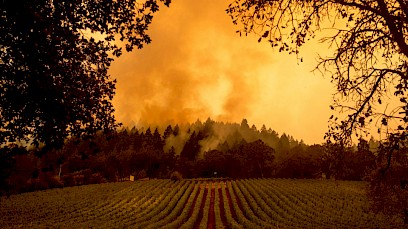Smoke from B.C. wildfires could taint the province's grapes for wine
 The raging wildfires in British Columbia have already destroyed homes and forests, and now the province’s wine industry is at risk of going up in smoke too.
The raging wildfires in British Columbia have already destroyed homes and forests, and now the province’s wine industry is at risk of going up in smoke too.
Researchers say ash and other toxic residue from the smoke could be seeping into the grapes, tainting them and making them bitter.
“Smoke-exposed grapes can sometimes lead to wines that are… really dominated by these smoky, ashy cigarette-like aromas that are pretty much unacceptable to consumers,” Wesley Zandberg, a chemistry professor at the University of British Columbia, told CTV’s Your Morning on Tuesday.
There are currently 262 active wildfires in B.C., with 85 of them in the Okanagan region – famous for its vineyards and wineries.
While it’s sometimes easy to remove the grapes, which simply smell like smoke, other times, smoke particles can bind onto sugar molecules in the grapes and make the contamination imperceptible to the human nose, Zandberg said.
“It’s a little bit of a game to predict what the wine quality is going to be like.”
His research is focused on detecting that contamination before grapes are harvested.
Figuring that out will be crucial for winemakers who don’t want to invest time and money harvesting and fermenting tonnes of grapes, only to discover the wine is tainted and must be thrown out.
SMOKE TAINT COULD BE REMOVED
One of the ways Zandberg said winemakers could combat smoke is by using different yeasts or refining agents to remove the smoke taint as grapes are being harvested.
However, Zandberg is trying to get ahead of the problem even earlier in the wine-making process by trying to prevent the grapes from becoming tainted before they leave the vineyard. His team is looking at government-approved agricultural sprays, which could shield the grapes from the smoky compounds from seeping in.
“The jury is still out,” he admitted. “Our results sometimes show we achieve crop protection. Sometimes we don’t. So these is an area we’re still actively working on.”
TAINT AFFECTED BY HOW FAR SMOKE TRAVELS
Contamination also largely depends on how far the smoke has travelled, Zandberg said. So smoke that’s come from farther away has less of a chance to affect wine grapes.
“We know that in 2020, B.C. had a relatively mild fire year, but we got a lot of smoke from California late in the season, when grapes are especially vulnerable,” he said.
“But that was old smoke and winemakers here didn’t really notice much taint then.”
British Columbia has already surpassed the 10-year average for the number of forest fires and total hectares burned.
So the work of Zandberg and colleagues in Australia is going to be even more pressing, as climate change continues to drive up the number of wildfires and extreme weather events.
You can return to the main Market News page, or press the Back button on your browser.

